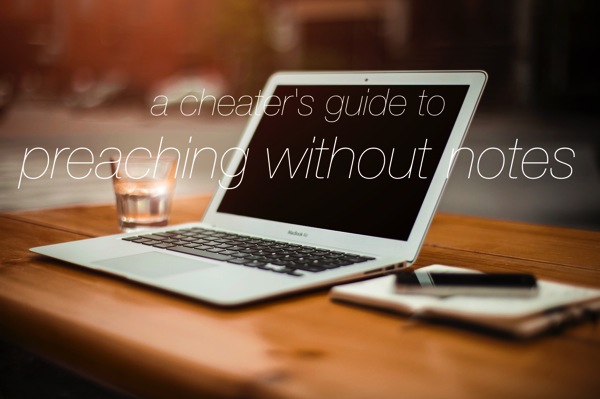 As a preacher, one of the most valuable tools that I find in preaching, is preaching without notes. The idea of preaching without notes is one that I’ve loved whenever I’ve seen it done. But the idea of doing it is quite frightening. It is extremely nerve-wrecking to consider standing in front of a congregation without your trusty notes to guide you through.
As a preacher, one of the most valuable tools that I find in preaching, is preaching without notes. The idea of preaching without notes is one that I’ve loved whenever I’ve seen it done. But the idea of doing it is quite frightening. It is extremely nerve-wrecking to consider standing in front of a congregation without your trusty notes to guide you through.
As I’ve begun preaching regularly for our entire congregation, I’ve tried to make it a regular practice do preach without notes.
Why?
If I can’t remember what I’m talking about, how will the congregation be able to remember what I said? Years ago, I listened to a preacher talking about communication and he suggested that giving a sermon should be like talking about your own family. What he was suggesting is that a sermon should be something that is so deep within you that it doesn’t feel like your reading from a script or a page of notes.
Some Tricks to Help You Preach without Notes:
1. Practice, practice, practice.
One of the best ways to diminish the need for notes is by practicing. When I preach, I practice a ton of times, each time reducing the amount of notes that I use when practicing. When I start practicing on Tuesday, I might be at about 6 or 7 pages of notes. Each day this gets significantly reduced so that finally by the end of the week I hardly need 1 page of notes.
Now, I get it, some people suggest that they really don’t like to practice. But nobody likes to practice.
But it helps. And while it might seem unnatural to practice your sermon out-loud, it will probably make it much more natural when you actually deliver the sermon.
2. You can still use notes.
One of the tricks I learned about preaching without notes is that I can still have notes. I just keep them hidden and have them to fall back on if necessary. Because of the practice I really don’t need the notes much, but I do have them and can strategically use them when we open up and read the Bible.
Throughout the week when I am practicing my sermon, I also use that time to get my notes down to a single sheet of paper. I end up making that paper into two columns so that I can have a single sheet of notes that can be laminated and fit within the pages of my Bible while I’m preaching.
I use the notes as a bookmark and will occasionally reference it if need be.
Download a copy of notes I've used in a sermon.
3. Think in chunks.
As I reduce my notes, what I’ve learned is I have to think in chunks for my sermon. This means I have an idea for what I want to communicate but I also need to have a way to reference that idea enough in my notes so that its short. A friend of mine suggested that one way of looking at these chunks would be like doors to a room. Think of your sermon as a house that you want to explore. The chunks are simply the doors into the rooms. You need the doors to help you remember where you are going, but once you have the door you then can open it up and start showing people around.
